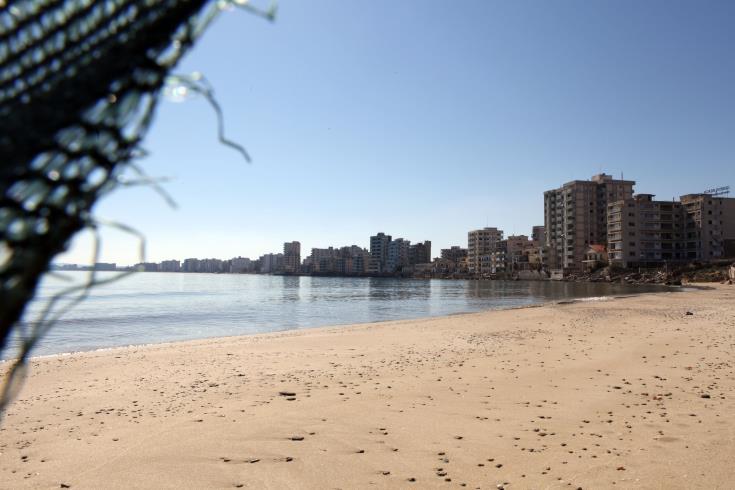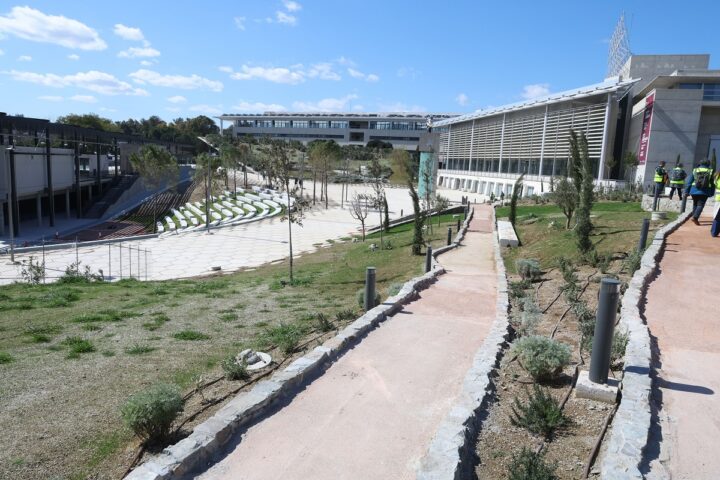Nicosia was caught off-guard as the authorities in the Turkish occupied north of the island announced they are to open part of Varosha, according to main opposition party AKEL.
AKEL accuses the government that its tactic of trying to push Turkey into the corner backfired while ignoring the writing on the wall, “as the Turkish side had openly said that they would open Varosha”.
In comments to CyBC radio, AKEL general secretary Andros Kyprianou argued that the government’s tactics failed as Turkey President Recep Tayyip Erdogan announced in a meeting with Turkish Cypriot ruling coalition leader Ersin Tatar that they would open part of Varosha on Thursday.
“It is a pity to see the government trying to justify the unjustifiable mistakes they have made in handling the situation,” said Kyprianou.
He argued the government opted for a push and shove tactic, “ignoring that Turkey has always done what it has said it would do.
Turkey just waits for the right moment to implement its plans, that is when they will be faced with the least consequences from the international community,” Kyprianou said.
He argued the government ignored Turkey’s and Turkish Cypriot politicians’ statements regarding the opening of Varosha, made as early as February.
“Just two months ago the leader of (ruling party) DISY dismissed statements from Turkish Cypriot politicians about Varosha, saying that he is not worried about Famagusta as Turkey will not make good on its threats.”
He argued that the way out of the dead-end is to push for negotiations on the Cyprus problem to restart.
“They are opening a part of the seafront. However, their ultimate goal is to create settlements in Varosha. Our goal should be the solution of the Cyprus problem”.
Kyprianou argued that the opening of the beachfront is also part of Turkey’s intervention in Sunday’s election for the new Turkish Cypriot leader.
It favours the leader of the ruling coalition Ersin Tatar.
Turkey’s meddling has caused a fierce reaction from the Turkish Cypriot community, but also of other leading political figures such as incumbent Turkish Cypriot leader Mustafa Akinci.
“Akinci is reacting for two reasons. One, as he himself said, Turkey’s intervention shames the community and its democratic processes, and secondly, they will bring about a blow to the Cyprus problem,” said AKEL’s general secretary.
He explained that if Varosha is lost, then a solution to the Cyprus problem will be unreachable as a possible solution would have to include an agreement on territory which is to be returned to the Cyprus Republic.
“The move to open part of Varosha is also testing the waters in the international community to see how the opening of Varosha will be taken.
They are also testing the Greek Cypriot side, expecting that we will make mistakes such as reacting by closing the crossing points.”
Unacceptable situation
DIKO’s European Member of Parliament, Costas Mavrides said that Cyprus was too soft with Turkey, accusing the government of throwing in the towel at an EU summit where Cyprus attempted to push for sanctions on Turkey in exchange for its support to sanction Belarus officials.
“President Anastasiades gave into Greece who wanted to avoid sanctioning Turkey shortly before the summit, confirming his tendency to back down, pleasing people like Merkel and his narrow party environment and some marginal platforms without popular support in Cyprus”.
He argued the government and Athens were unable to make the most out of “the most favourable situation for Hellenism for decades – with Turkey politically isolated and a fragile Turkish economy”.
President Nicos Anastasiades, who as recently as last week was involved in a tense stand-off with his EU peers for his push to tie sanctions on Turkey with sanctions on Belarus, said: “This is an exceptionally unacceptable situation.”
Following the meeting of the National Council, at the Presidential Palace on Tuesday, the President said: “Everything that Turkey decided is in violation of the resolutions of the United Nations and the decisions of the Security Council. It is considered as a totally unacceptable situation.”
The President also said that Nicosia will promptly file a recourse to the United Nations Security Council.
The north’s and Turkey’s plan is to open up about 1.5 km of beachfront to the public and not the approximately 6 square km inland that includes abandoned hotels and residences which its population of some 40,000 people fled in 1974 during the Turkish invasion.
Varosha, dubbed as a ‘ghost town’, is a suburb of the larger town of Famagusta.
It was once famous for its coastline of thick golden sand, which consists of the majority the town’s coastline.
Currently, just about 200 meters of the coastline is accessible to the public in the shadows of bombed hotels and buildings, which were left to rot after the 1974 war, as the area of Varosha was sealed off with barbed wire which extends into the sea.









